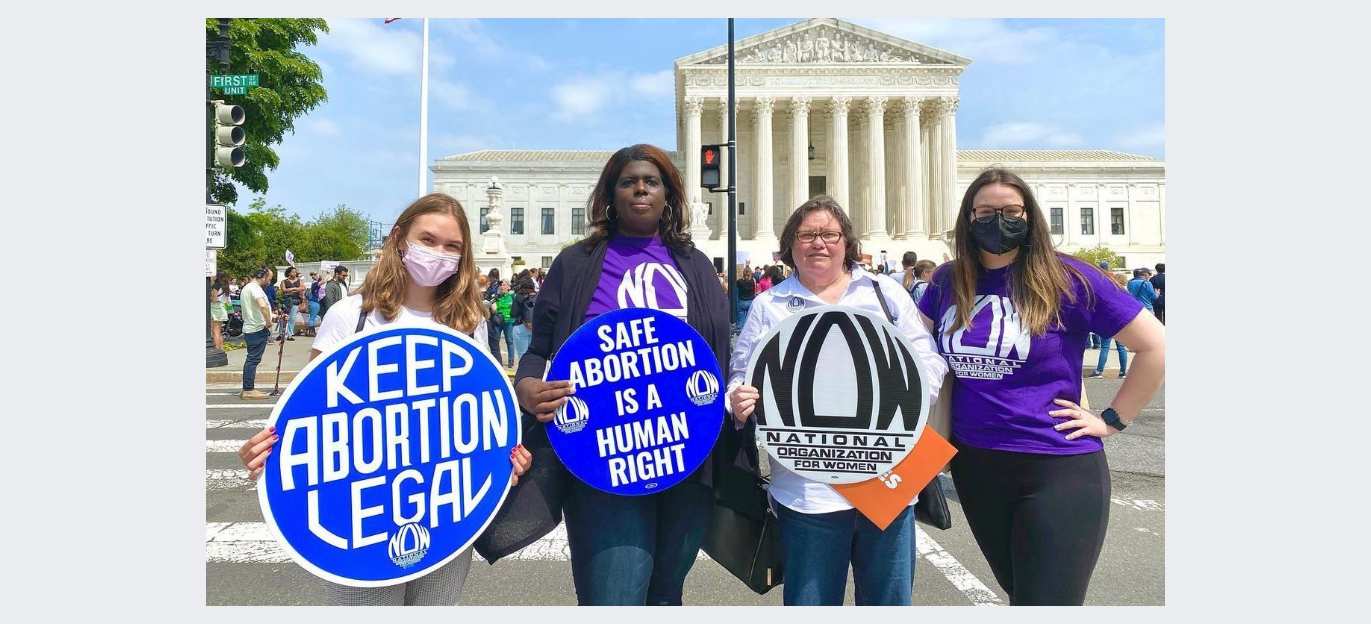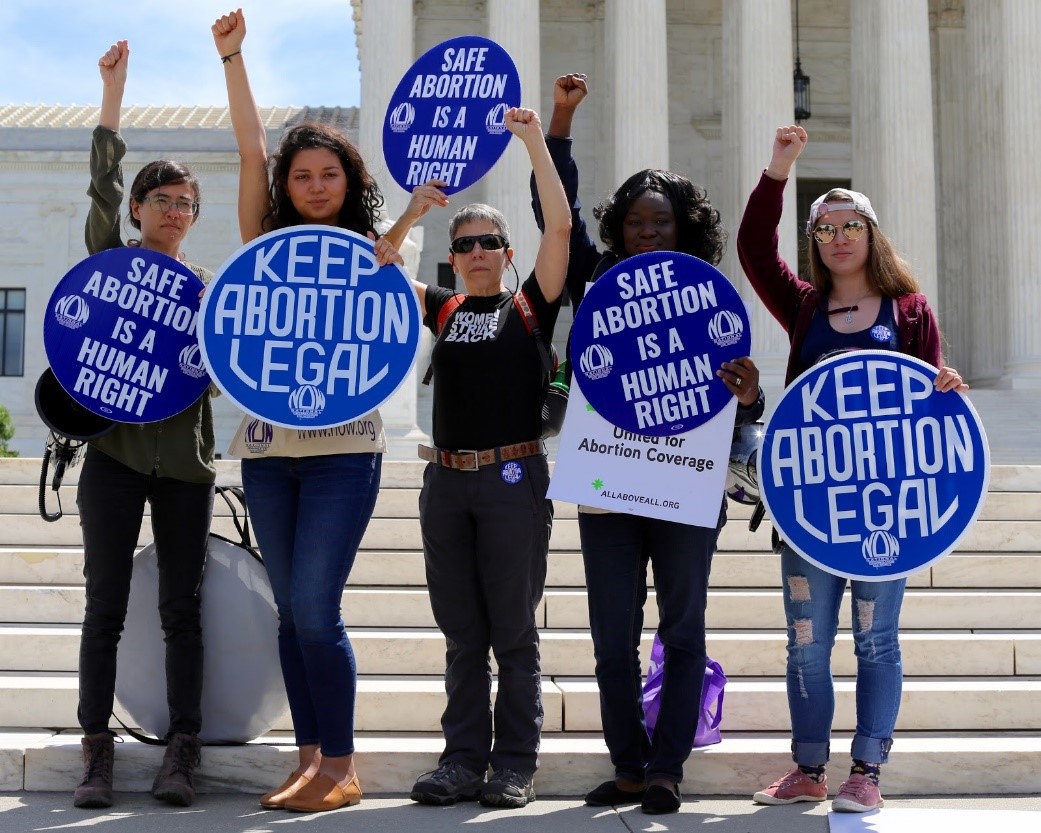Reproductive Rights and Justice

“No matter what men think, abortion is a fact of life. Women have always had them; they always have and they always will. Are they going to have good ones or bad ones? Will the good ones be reserved for the rich, while the poor women go to quacks?”
– Shirley Chisholm, Unbought And Unbossed
On June 24, 2022 the nightmare scenario so many of us feared became a dystopian reality. In a 6-3 decision in Dobbs v. Jackson Women’s Health Organization, the Supreme Court struck down Roe v. Wade, stripping women’s and all pregnant persons’ bodily autonomy and opening the floodgates for anti-woman states to impose onerous restrictions on abortions without exceptions for rape, incest or medical care for the pregnant person.
Full abortion bans are already in effect in nearly two dozen US states or limited access to the procedure, and the legal status of abortion care is precarious in at least 20 more.
Despite this devastating set back NOW will continue our historic work toward accessible reproductive health care for all women and LGBTQIA+ people. NOW fully supports safe and legal abortion care, affordable and effective birth control and other contraception, medication abortion, telemedicine for reproductive care, and reproductive health education for all. We fiercely oppose attempts to restrict reproductive freedom through underhanded legislation and regulations.
g toward accessible reproductive health care for all women and LGBTQIA+ people. NOW fully supports safe and legal abortion, affordable and effective birth control and other contraception, medication abortion, telemedicine for reproductive care, and reproductive health education for all. We fiercely oppose attempts to restrict reproductive freedom through underhanded legislation and regulations.
How we got here
The overturning of Roe v. Wade has been a goal of extremists since the decision was first announced in 1973. And although Roe v. Wade provided constitutional protection for abortion, there has never truly been unfettered access to abortion care, especially for people being paid lower incomes and the BIPOC and LGBTQIA+ communities.
Conservative states have implemented hundreds of restrictive and unnecessary TRAP laws (targeted restrictions on abortion providers) designed to shutter abortion care providers by imposing expensive, burdensome, and unnecessary requirements on clinics. States have implemented six-week bans and total bans, personhood amendments, fetal heartbeat laws, waiting periods, informed consent requirements, bans on public funding, insurance prohibitions, and other unnecessary clinic regulations.
These onerous laws are designed to deter women from choosing abortion care and make it more difficult to obtain for those who do. And now the Dobbs ruling strips away the Constitutional protection for abortion care, leaving access for millions of women at risk.
But now that Dobbs has become a reality, some states are rushing to maintain and even expand the right to abortion. On the federal level, there are longer-term efforts to codify the right to abortion, bodily autonomy, and privacy, as well as shorter-term efforts to urge the Biden administration to use any executive power it must to make a change.
The simple fact is that people will continue to seek abortion care. But now women and all pregnant persons in many states will be seeking illegal unsafe abortions. As activists, we must rally together like never before to restore and improve full and equal access to reproductive health care.
1 in 4 women in this country receive abortion care, and 85% of Americans think abortion should be legal in some or all circumstances. But one man who lied his way into a presidency then appointed Supreme Court justices who lied under oath in order to be confirmed. Those few individuals then stripped away a basic human right that is supported by millions of us.
What we must do next
We are understandably outraged at the Supreme Court’s neglect of women’s healthcare and human rights. We know the damage this will do, and we feel for the people who will suffer. Overturning Roe is already heavily impacting women of color, LGBTQIA+ individuals, disabled reproductive bodies, and poor women and birthing bodies.
We cannot ignore our dismally high maternal mortality rate, 23.8% as of 2020, and how women of color – Black women specifically – have a maternal mortality rate of 55.3% in 2020. That number is too heartbreaking to bear. The reasons for these high mortality rates are rooted in racism, sexism, and classism, as is the decision to overturn Roe.
That’s why NOW’s dedicated activists will not stop fighting. Just as we mobilized nearly a half-century ago to secure reproductive rights for all, we will step up once again to keep lawmaker’s hands off of our bodies! See our “Take Action Checklist” below for more details on how you can become a reproductive rights champion.
Everyday concrete actions do make a difference. We must find ways to mitigate the damage of this unjust ruling until there is a national remedy, either through an overturning of the Supreme Court’s ruling or legislative action. We won’t stop until abortion care is legal, safe, and accessible for every person needing it throughout the United States.
What Policymakers Are Doing
White House Fact Sheet: Biden-Harris Administration Continues the Fight for Reproductive Freedom
President Biden’s Executive Order
On July 8th, 2022, President Biden issued an Executive Order aimed at protecting access to reproductive care services. The Executive Order calls on the Secretary of Health and Human Services (HHS) to:
- Safeguard access to reproductive care, including all forms of abortion and contraception;
- Protect patients’ privacy and access to accurate information;
- Promote the safety and security of patients, providers, and clinics; and
- Coordinate federal efforts to protect reproductive rights and access to healthcare
While this is a wonderful first move, we need actual laws to be passed by Congress to fully guarantee our rights to abortion care and other reproductive health services.
Reproductive Justice Taskforce
On July 12, 2022, the Department of Justice announced the establishment of the Reproductive Rights Task Force, formalizing the Department’s ongoing work to protect reproductive freedom under federal law.
Congress on the Move
In the U.S. House of Representatives, Democrats have pushed to codify abortion rights. Two bills, the Women’s Health Protection Act of 2022 and the Ensuring Access to Abortion Act of 2022, were passed in the last session of Congress.
- The revised Women’s Health Protection Act would prohibit “governmental restrictions on the provision of, and access to, abortion services.”
- The Ensuring Access to Abortion Act would “prohibit the interference, under color of State law, with the provision of interstate abortion services, and for other purposes.”
However, due to the filibuster, a relic of our country’s racist past, it will be almost impossible for these bills to pass in the Senate. We need a new filibuster-proof Congress that will codify abortion rights nationally, and we need state legislatures that will make protecting women’s health a priority.
A majority of Americans support access to abortion care. We know that there’s a feminist majority of voters who can change the course of history in upcoming elections and who can push their representatives to protect our collective rights to reproductive freedom. We need your collective voice and collective power so that we can defend and restore the protections of Roe. We cannot fail, and we will not fail.
What is Medication Abortion?
With restrictions on abortion care at an all-time high it’s more important than ever to uplift the issue of medication abortion care.
The use of mifepristone has increased significantly over the years. In 2017, 40 percent of all recorded abortions and 60 percent of abortions performed up to 10 weeks of gestations. Most women seeking abortions now use this safe and effective medication.
Former NOW president, Ellie Smeal, was instrumental in bringing the drug mifepristone/misoprostol – then referred to as RU-486, to the United States. NOW testified at the FDA’s Advisory Committee meetings in support of agency approval in the late 1990s. Learn more about NOW’s involvement in the FDA’s approval of mifepristone, here.
Reproductive rights advocates and the Biden Administration are pushing back against efforts to limit access to medication abortion (mifepristone). During the early months of the pandemic, abortion rights opponents tried to prevent women from accessing medication abortion via telehealth (using telecommunications for patients and providers in different locations) when a visit to a doctor’s office was difficult or impossible. Once President Biden took office and lawsuits were brought, administrative efforts were made to improve access and re-evaluate unnecessary restrictions, known as Risk Evaluation and Mitigation Strategies (REMS), on abortion medication.
The FDA’s Decision on Medication Abortion
On December 16, 2021, the FDA issued permanent modifications to the REMS. This decision:
- Removed an in-person dispensing requirement.
- Added a requirement that pharmacies which dispense mifepristone must be certified.
- Maintained the prescriber certification and Patient Agreement Form requirements.
Whether clinicians can dispense mifepristone by mail is a state-specific legal question. If your state has a law regulating medication abortion, it remains in effect.
However, in states without laws or regulations requiring in-person dispensing of mifepristone, clinicians who are certified via the provider agreement form can mail mifepristone to patients. The Guttmacher Institute provides resources reviewing state laws and policies related to medication abortion and abortion in general.
If you have questions about state policies impacting access to medication abortion, you can reach out to ACOG’s State Government Affairs team (stateleg@acog.org) or submit an inquiry through ACOG’s Spontaneous and Induced Abortion Resource Center.
Learn more about Medication Abortion.
Why we must keep fighting
Ultimately, our fight for reproductive justice is more important now than ever, because the injustices will not end with the Dobbs ruling. Dobbs and Roe are connected to so many other fundamental rights and liberties that are now at stake. It is not just our bodily autonomy at risk, but also our right to privacy, our guaranteed protections under the 5th and 14th Amendments, and our freedom and our liberty.
We must continue fighting for the bodily autonomy of everyone — especially Black, Brown, and Indigenous women, LGBTQIA+ communities, people with differing abilities, and people of intersecting marginalized identities, who have been and will continue to be impacted the most when it comes to these issues of injustice.
In the over 200-page diatribe that Justice Alito issued with the Supreme Court’s Roe decision, he never once mentioned rape or incest, or what would happen to those who became pregnant in those scenarios. This cruel disregard for survivors is becoming more and more prevalent among far-right extremists. Many fear that this Roe decision means other rights are under attack, including the right to contraception, infertility treatment, gender reassignment treatment, and more.
We know what a difficult time this is for our movement. So many of us have been at the forefront of this issue for so long. But we won’t back down and we won’t allow a return to the dark days of back-alley abortions with women dying in the streets. We will unify, we will organize and we will elect policy makers at all levels who will codify our right to bodily autonomy once and for all.
Reproductive Justice and the BIPOC Community

“Women of color are disproportionately more likely to need an abortion, with Black women seeing the highest unintended pregnancy rate of any racial or ethnic group. Black women also lead the nation in maternal mortality rates, a number that is sure to rise if Roe falls. The reproductive autonomy of BIPOC women is inextricably linked to the legacy of racial oppression and discrimination.”
-NOW President Christian Nunes as quoted by Inside Sources.
We of course know that the Roe decision and all of the restrictions on abortion care are even more devastating to BIPOC communities, the LGBTQIA+ community, those being paid lower incomes, and underserved communities.
Some women will be able to afford to take time out from work and have the means to travel to receive abortion care in a state where it isn’t banned, but many don’t — particularly women already experiencing economic insecurities and affected by poverty rooted in systemic racism such as those from BIPOC and disenfranchised communities.
For many, days away from work could mean not making the rent or losing their jobs altogether. The lawmakers who passed restrictive abortion care laws may have no lived experience dealing with the constant pressure of economic anxiety, job insecurity, and the constant struggle to keep their families above water — but that’s a daily way of life for millions of women.
NOW members and allies know that attacks on abortion care are attacks on not only reproductive justice but on racial justice, economic justice, and whole health as well.

Take Action Checklist
To help restore full and equal access to abortion care and reproductive freedom we must all work together and speak out. There is so much you can do as activists.
- Contact Congress
- There are vital pieces of legislation that can help us achieve our goal of ending violence against women, including:
- Women’s Health Protection Act of 2022
- The Ensuring Access to Abortion Act of 2022
- Additionally, we need to speak out in support of comprehensive legislative actions to protect reproductive health:
-
- Federal and state governments must lift restrictions to allow for access to medication abortion via telehealth services
- Congress must repeal the Hyde and Helms Amendments
- Congress must end the Global Gag Rule permanently
- Congress must increase Title X funding to better meet the need for family planning and other preventive care services to low-income, uninsured, and under-insured individuals and families
- Congress must expand coverage for contraception under the Affordable Care Act and increase funding for the Teen Pregnancy Prevention Program.
- Congress must end federal funding for non-science-based abstinence-only until marriage programs
- Call the Capitol Switchboard at 202-224-3121 and be connected to your representatives in the House and Senate to tell them you want abortion rights and reproductive health care rights codified into law. Here is a directory of current members of Congress. If you can call when Senators and representatives are home in your state, you can contact one of their several in-state offices. Just check their websites to find contact information.
- Don’t forget to reach out to your local elected officials too:
- Call your state representatives — Sample script
- Contact your local representative — Sample script
- Educate yourself on the issues before you reach out. Check out some recent NOW Action Alerts, Issue Advisory, Media statements, and more on Reproductive Rights:
- ROE is Overturned, NOW What?
- Call Both Your Senators – Tell them to Pass the Women’s Health Protection Act NOW
- End the Filibuster NOW Blueprint for Reproductive Health,
- Rights and Justice NOW President Testifies Against Puerto Rico’s Extreme Abortion Bans
- Issue Advisory: We Won’t Go Back: Tracking the Fight for Reproductive Justice
- Medication Abortion: Just the Facts
- Mobilize for Abortion Rights
- Women will not be silenced
- We Won’t Go Back: Tracking the Fight for Reproductive Justice
- Issue Advisory: Risks of pregnancy
- Become a NOW member to receive regular updates and action alerts on issues surrounding reproductive health.
- Attend or organize a “Bans off our Bodies” rally with your local chapter, especially in states that are seeking to restrict access to abortion care. Or host your own rally in support of abortion care and reproductive rights. Learn more with our Rally Checklist.
- Speak out on social media:
- Share your thoughts on abortion care and reproductive health on social media — use our digital toolkit as a guide.
- Dates to highlight for social media outreach:
- January 22: Roe Day, The day Roe v. Wade became law
- March 8: Women’s Rights Day
- March: 10: National Day of Appreciation for Abortion Providers
- June 24: Anniversary of the Dobbs v. Jackson Women’s Health Organization decision that overturned Roe.
- Sept. 26: World Contraception Day
- Sept. 27-Oct. 1: Abortion Justice Week of Action
- Sept 28: International Safe Abortion Day
- Dates to highlight for social media outreach:
- Share your thoughts on abortion care and reproductive health on social media — use our digital toolkit as a guide.
- Write Letters to the Editor in support of Reproductive Rights and Justice — Sample letter template
- Campaign, Volunteer, and Vote for pro-choice candidates at the national, state and local levels
- Join our RUN NOW program to learn more about working for or starting your own campaign.
- Become a clinic escort:
- To find your local clinics, visit the websites for the National Abortion Federation and Abortion Care Network, both of which have maps that will show you all the abortion-providing clinics in each state. Then, once you’ve decided on a place or two where you’d like to volunteer, reach out to the clinics to inquire about their needs.
- Speak out loudly and often in support of abortion care rights wherever and whenever you are able. Whether it is on social media, in an op-ed, letter to the editor, rally speech, or even just at the family dinner table, you can educate others on why safe, legal, and accessible abortion care is so vitally needed.
Additional Resources
Medication Abortion
- The Abortion Pill | Get the Facts About Medication Abortion (plannedparenthood.org)
- 21 Years After FDA Approval, Abortion Pill Is More Critical Than Ever – Ms. Magazine (msmagazine.com)
- Expanding Medication Abortion Access (EMAA Project), emaaproject.org
- ACOG’s Spontaneous and Induced Abortion Resource Center.
Blogs
This Bisexual Health Awareness Month, Women Deserve More from their Healthcare Providers
I came out as bisexual my senior year of high school. No one had ever talked to me about what it meant to bisexual, queer, or LGBTQIA+ in general – at least not in a way that was memorable. In my health classes, there was little to no mention of LGBTQI Read more...Kavanaugh: A Threat to Women and Our Constitutional Right to Privacy
The danger that Judge Brett Kavanaugh poses to reproductive health and freedom in the United States cannot be overstated. It cannot be over-publicized, over-discussed, over-analyzed, or over-protested. His nomination to the Supreme Court of the United Read more...TRAPPED: A New Must See Documentary about Targeted Regulations of Abortion Providers
By Sarah Nealon, President’s Office Intern On June 15th, the Center for Reproductive Rights hosted a viewing of the Documentary Trapped, directed by Dawn Porter, in the Senate Congressional Briefing Rooms. I, along with other NOW interns, was able to a Read more...News
‘The View’ abortion ad signals wider effort to use an FCC regulation to spread a message
“It’s definitely concerning,” Nunes said. “No one should be able to use running for office as a free pass in order to spew hate speech.” – Christian F. Nunes, president of the National Organization for Women Read more...NOW Joins International Safe Abortion Day
September 28 is International Safe Abortion Day. This observance began in Latin America and the Caribbean in 1990 as a day of action for decriminalization of abortion. The date was chosen to commemorate the passing of the Law of Free Birth passed by Read more … Read more...Abortion measures on ballots in record number of states
“This shows overwhelmingly that voters believe in abortion access, and it disputes all the misinformation and disinformation that we’ve been hearing about abortion access and belief that people do not care about it,” Christian F. Nunes, the president of the National Organization for Women, which advocates for women’s rights, told NewsNation. “People do care about abortion access,” she said. “Lawmakers writing these oppressive laws were not taking into consideration what the voters really wanted, and were writing for their own sense of power and control, not thinking or even hearing out their constituents so many of them took matters into their own hands.” Read more...Resources
Issue Advisory: We Won’t Go Back: Tracking the Fight for Reproductive Justice
The long-awaited catastrophe has finally occurred. On June 24th in a 6-3 decision in Dobbs v. Jackson Women’s Health Organization, the Supreme Court struck down Roe v. Wade, stripping women’s and pregnant persons’ bodily autonomy.
Medication Abortion – Just the Facts
The use of mifepristone has increased significantly over the years. In 2017, 40 percent of all recorded abortions and 60 percent of abortions performed up to 10 weeks of gestations – though the rate is likely higher due to self-managed abortions which are not recorded. Most women seeking abortions now use this safe and effective medication.
Abortion Cases in the SCOTUS Pipeline: What Can We Anticipate?
With the confirmation of Amy Coney Barrett, which has clinched a 6-3 majority on the high court, we should not expect to win many cases related to women’s rights. Those cases that pertain to reproductive rights are clearly in peril.
Right-Wing Abortion Rights Opponent Set for High Court – Majority Leader McConnell Says He has the Votes
The National Organization for Women opposes the confirmation of Judge Amy Coney Barrett as, by her record, she stands against everything we value about equal treatment and equal opportunity.

